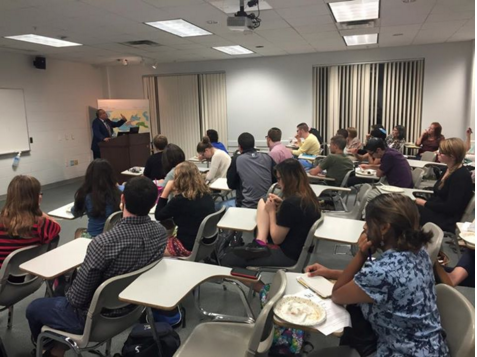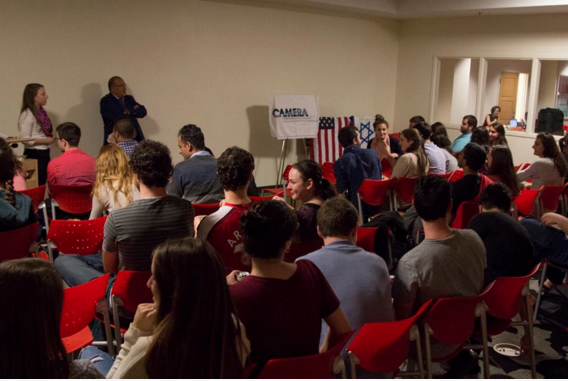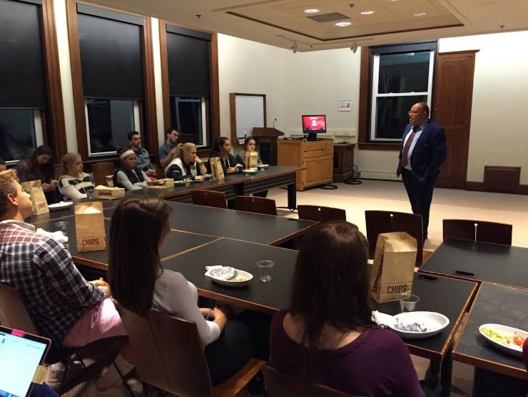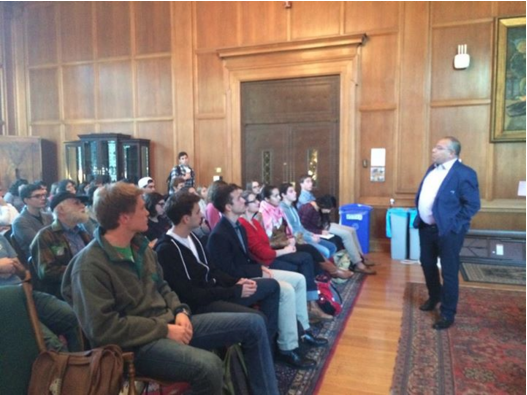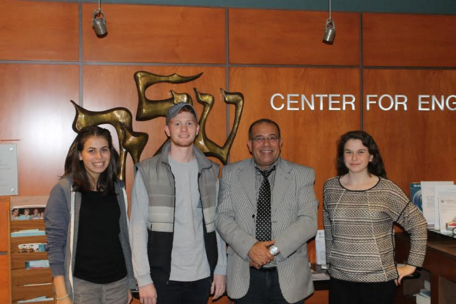Palestinian human rights activist Bassem Eid is most well known for “raising awareness according to the realities on the ground” on the Israeli Palestinian conflict.
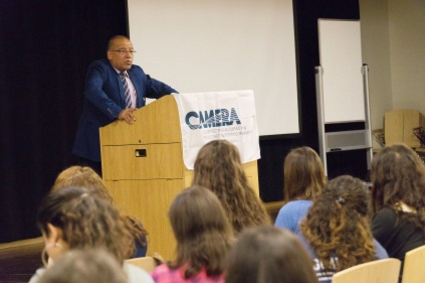 Bassem, born and raised in Jordanian occupied East Jerusalem, began working for B’Tselem in 1988 to advocate for Palestinian human rights. Since then, he has broken off to work for his own human rights organization: Palestinian Human Rights Monitoring Group. Bassem whistle blows on human rights violations committed by the PA against the Palestinians. He was arrested and jailed by Arafat for this work and today speaks around the world about his experiences .
Bassem, born and raised in Jordanian occupied East Jerusalem, began working for B’Tselem in 1988 to advocate for Palestinian human rights. Since then, he has broken off to work for his own human rights organization: Palestinian Human Rights Monitoring Group. Bassem whistle blows on human rights violations committed by the PA against the Palestinians. He was arrested and jailed by Arafat for this work and today speaks around the world about his experiences .
T: Why did you start the Palestinian Human Rights Monitoring Groups (PHRMG)?
B: I started my human rights career with an Israeli organization, B’Tselem, I worked for B’Tselem for 7.5 years and when the Oslo Agreement was signed between the PLO and the state of Israel, B’Tselem decided that tsince theyare an Israeli organization, they are not going to interfere in the violations committed by the Palestinian Authority against Palestinians. I was totally against such a decision because I said to B’Tselem at that time that your main mission is protect Palestinians rights from violations, it never said if it was by the Israelis or the Palestinian authority. B’Tselem should have to take a position against all perpetrators of those violations, never mind who committed them. Unfortunately, B’Tselem didn’t accept it, and this is the main reason that after seven and a half , I resigned from B’Tselem and created PHRMG in turn to monitor and control the violations committed by the Palestinian Authority (PA) against the Palestinians.
T: Do you find there is a need for speakers like you on college campuses?
B: I think when it comes to campuses, yes indeed. Unfortunately, I know a lot of Palestinians who are speaking out, but they don’t speak English. Some speak fluent Hebrew and I invite them to speak, but only to the Israelis. I want Palestinians to take a bigger approach to foreign students—Americans, Asians, South Africans, Europeans, I think that there is a huge need in this moment for more and more Palestinian speakers to come and explain the real situation on the conflict. I think the media has misled the majority of students. The media is losing the ethics of journalism. That means that the media became a yellow media and they are biased.
T: What kind of an impact do you want to have on students? Who is your audience?
B: First of all, my audience are all foreigners, not Palestinians. Second, I am not a person looking after influence. I am much more interested in raising awareness. If I succeed in raising awareness according to the realities on the ground then I believe that these students automatically will be influenced. My main mission is to make a campaign and raise awareness about realities on the ground and an understanding for people who have never been in the region and to tell them exactly what is really going on. I believe there are a lot of students seeking first hand information. Unfortunately, though, there are a lot of students who are trying to make propaganda. I think the universities themselves should have to use rules for outside speakers. I think universities lose control over lectures when students disrupt events for the sake of chaos.
T: People critical of your presentation say that there are not enough Palestinians speaking out about the violence in the PA and Gaza. What are your thoughts on this?
B: Unfortunately, I don’t think this is the reality. I know that the major problem is the media. Why is the media starting the violent storm in East Jerusalem? Since the start of the recent violent, no one has stopped to ask me what I think. It seems to me, the media has no interest in calming the situation. It’s the opposite- the interest of the media is how to add fuel to the flame. There are so many Palestinians against what is going on, but it looks like the media has no interest to interview them. This is a problem with the media. The media wants to manage the conflict, not solve it.
T: What are some tough questions you are asked on campus?
B: I think the toughest question is: Why you are not blaming Israel? Why are you blaming the Palestinians? It’s a tough question but of course I have 1,001 answers for a question like this. My point is, if we want to be a nation, a recognized nation, we the Palestinians have to start believing in self-criticism.
T: Have you experienced counter protests on campus or elsewhere?
B: Not so much, from what I remember. However, Boycott Divestment and Sanctions Movement (BDS) proponents issued five different press releases against me, most recently at Auckland University in New Zealand and a year ago in South Africa. I keep BDS busy; they don’t keep me busy. When they publish a press release about me, it helps my cause because it points out the biggest flaws in BDS. BDS is a prelude to genocide to the Palestinians. I think these people not only want to destroy Israel, I think they also want to harass and destroy the Palestinian economy. I would never in my life believe the BDS supports human rights; that they are seeking peace between Palestinians and Israelis. I believe they are a new organization that is gaining money and power off the suffering of Palestinians, much like UNRWA.
T: How do you suggest students participate in making life for Israelis and Palestinians better?
B: The students must look at Israelis and Palestinians as human beings. We are all people and we must respect each other. If you deny the rights of the others, the others will deny the rights of you. They must have confidence themselves before they can have confidence about the Israeli Palestinian conflict. Students sometime cause damage because they blow stories out of proportion. My suggestion is please, come to the region and meet Israelis and Palestinians who have full cooperation in their professional and personal lives. I believe that such a trip will change the minds of the students.

